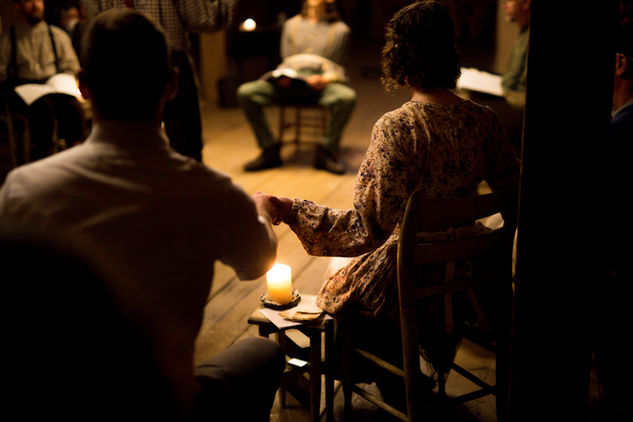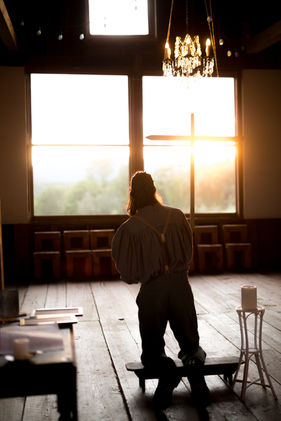

Second Sight;
Or,
The Way of Holiness
– A New Stage Play –
Written by
Ryan Mangan
Genre
Mystery/History
About
Developed from Colonel Henry Olcott's first-hand accounts of
the Eddy Family phenomena at Chittenden, Vermont in 1874.
-
Second Sight; or, The Way of Holiness is a frightening theatrical experience that weaves magic with drama. Through the lens of 19th century Vermont, the play explores themes of morality, death, sacrifice, fanaticism, and delusion.
Cast
5M+, 3F
Length
Two Acts
Duration
120 minutes
Ages
12+
Characters
Col. Henry S. Olcott, journalist, 42
Dr. George M. Beard, skeptic, 44
Helena P. Blavatsky, occultist, 43
William H. Eddy, farmer, spirit medium, 35
Horatio G. Eddy, farmer, spirit medium, 31
Mary C. Eddy, farmer, spirit medium, 28
David Tupper, visitor with a terrifying backstory, 20
Harriet Critchum, visitor in desperation, 30-60
Anson Ladd, farmer, methodist 30-70
Synopsis
ACT I
The famous Eddy Brother mediums, William and Horatio, are stirring up the world with their mysterious spirit manifestations. A respected journalist, Colonel Henry S. Oloctt finds himself on assignment by the New York Daily Graphic to investigate the seances. During his stay at the homestead, he encounters a broad-minded, Russian occultist named Helena Petrovna Blavatsky and a highly skeptical neurologist named Dr. George Miller Beard. The three of them battle to discover the truth about the Eddy Brothers and the possibility of actual clairvoyance and spirit manifestation.
In attendance at these seances is a tragically credulous woman named Harriet Critchum who has traveled and payed much money to catch a glimpse of her little daughter "Hattie" who has long-since passed. A young farmer named David Tupper is also in attendance with a terrifying backstory. He hopes to speak with his tuberculosis-burdened siblings who exist only in the "other world".
Horatio discovers that his occupation as a medium entails a moral problem. He questions what business he holds meddling with the living and the dead. But his demanding older brother, William, insists that Horatio continue with the seances and avoid any suspicious behavior that may lead the public to think they are charlatans. Meanwhile their younger clairvoyant sister, Mary, offers all she can in aid to the bereaved who are lodging at the homestead.
ACT II
In a dark seance, Blavatsky is visited by her deceased Russian father, convincing her of the authenticity of the Eddy's abilities. Dr. Beard hears a lullaby that deeply reminds him of his dead mother; although he chooses to ignore its significance. Mary reveals to her brothers that Dr. Beard is a threat to the Eddy's reputation as he plans to publish an article on the foolishness of their demonstrations. Horatio, in his growing desire to end the seances, allies with Dr. Beard to announce them as frauds. During the final seance, William is called-out as a charlatan and Horatio proclaims that the Eddy Brothers have lived a life of deceit. Just then, the room plummets into darkness. Amid the chaos, Harriet Critchum is reunited with her "Hattie" and David Tupper receives a terrifying gift from the spirits of the other world. The light returns and the three Eddy siblings are under trance violently convulsing and levitating – astonishing all who look on.
A candlelit epilogue features historical accounts by visitors from 1874. In the final moment of the drama, Horatio blows out a candle, turns to exit, and the candle mysteriously reignites on its own. He gently acknowledges it and continues out with a soft hymn at his lips.
Our narrator, Col. Olcott, explains that he is fully convinced of the Eddy's authenticity and permits the audience to come away with their own conclusion of what they believe to be true. Is it possible that people like the Eddy's can exist, or should all supernatural intuition be explained away with dogmatic rationalism?
At Town Hall Theater, 2023
Directed by Kim Moyer

At The Cadwell Farm, 2021
Directed by Michaela Eckler

At Castleton University, 2016
Directed by Matthew Eckler
























































